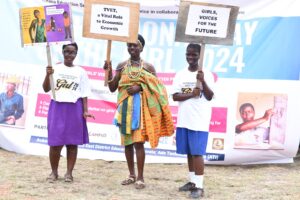…as they join the world to mark International Day of the Girl in Ada
By Juliet ETEFE ([email protected])
The Director-General of the Ghana Education Service (GES), Dr. Eric Nkansah has emphasised that despite advancements, girls continue to face significant barriers to accessing Technical and Vocational Education and Training (TVET).
This, he said is often due to socio-cultural misconceptions and gender stereotypes.
To this end, he called on parents, teachers, and policymakers, to collectively challenge these norms and create an enabling environment where girls can pursue technical education without fear of discrimination.
He highlighted this in a statement read on his behalf by the director of the Girls Education Unit at the GES, Gifty Asiedu, at Ada Technical Institute (ATI) during a community sensitisation durbar to mark the 2024 International Day of the Girl (IDG).
“TVET is a critical tool for empowering girls, offering them practical skills and increasing their employability. By fostering innovation and entrepreneurship, girls trained in these fields can contribute significantly to the economic development of their communities and the nation,” he stated.

The event was jointly organised by the British Council-Ghana, United Nations Children’s Fund (UNICEF) Ghana, CAMFED-Ghana, the All-African Students’ Union (AASU), Forum for African Women Educationalists (FAWE) among others, to promote girls’ education and inspire their career paths.
Themed “Girls’ Vision for the Future: Better Prospects in TVET,” the event highlighted the importance of technical and vocational education and training (TVET) in empowering girls with the skills they need to thrive in an evolving global economy. The event also featured a panel discussion with TVET role models and career professionals and a float through the streets of Ada.
The International Day of the Girl is celebrated globally to promote girls’ rights and highlight gender inequalities faced by girls worldwide.

Dr. Nkansah further urged all stakeholders to work together to ensure TVET is ecognized as a valuable option for girls, fostering a future where every girl can realise her full potential.
Equal opportunities and gender inclusivity
Director-General at the Ghana TVET Service David Prah, in a speech read on his behalf by Deputy Director-General of Management Services, Lily Gyimah also called for increased efforts to empower young women to excel in male-dominated fields.
He emphasised the need to challenge gender stereotypes and create more inclusive opportunities for girls in trades traditionally dominated by men.
“For too long, certain professions such as carpentry, welding, and electrical engineering have been regarded as the domain of men. Today, we challenge these perceptions. Every girl, regardless of background, has the right to dream, learn, and excel in any field she chooses.

“Imagine a world where girls from any village or city can design, build, and repair with the same expertise as their male counterparts. A world where they are celebrated for their skills and creativity, not judged by their gender. This is the future we are building,” he stated.
The TVET Service acknowledged the challenges that girls face in entering male-dominated fields, such as gender biases, limited access to resources, and the absence of female role models.

“Through partnerships, we can increase enrollment of girls in TVET programmes, provide mentorship opportunities, and create safe, supportive environments where they can thrive. Together, we can ensure that our girls receive high-quality education, training, and resources to prepare them for the workforce of tomorrow,” he reiterated.
“To every girl listening today, remember: The world is yours to shape. Your vision for the future is powerful, and with the right skills, you can turn that vision into reality,” the Director-General encouraged.
Break barriers and embrace leadership.
Also, in a keynote address on behalf of the Ada East District Chief Executive, Faustina Blewusi, District Director of the National Commission for Civic Education in Ada East, inspired the young girls to pursue education and leadership.
She stressed that education is the key to unlocking opportunities and building a future of empowerment and change, hence “When we invest in education, we invest in our future,”.

She also urged girls to embrace leadership opportunities and reject limitations imposed by society saying “Girls are not just the leaders of tomorrow; we are the leaders of today”.
Highlighting the importance of gender equality and equity, Ms. Blewusi advocated for policy changes to ensure equal access to education and leadership opportunities.
“Your vision for the future holds the power to inspire far beyond your surroundings. Don’t wait for tomorrow—start today,” she stressed, urging girls to envision a sustainable future and act on their dreams.

Inclusive education
The British Council reaffirmed its commitment to inclusive education and workforce development through its Schools Connect programme, which spans 11 African countries, including Ghana.
According to Gabriel Quarshie, Project Manager at the British Council Ghana, the initiative focuses on ensuring that education is accessible to all students, regardless of their background.
He also expressed the Council’s eagerness to collaborate with stakeholders to create inclusive learning environments that promote opportunity, equality, and sustainable development.
“We are open to partnerships to ensure the success of this journey. We aim to work with key partners to bridge this gap and create a globally competitive job market,” he stated, emphasising the importance of teamwork in achieving long-term goals.

He emphasised, “We are dedicated to fostering peace and prosperity by building bridges between people in the UK and countries worldwide. ” These efforts aim to create opportunities that benefit students and communities alike.
Through programmes like Schools Connect, the British Council is not only equipping students with essential skills but also positioning them as valuable contributors to the global economy.










